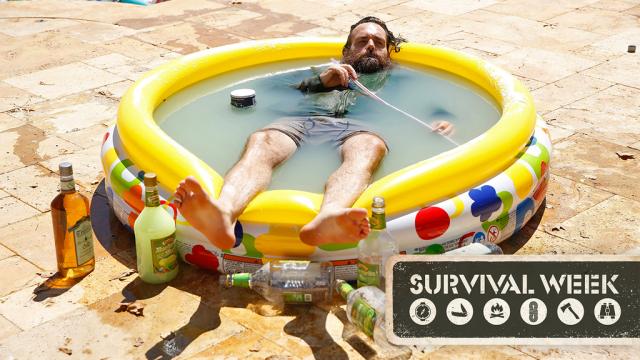I love a good post-apocalyptic tale. The Road, The Walking Dead, The Leftovers — these are all fine examples of end-times entertainment. But the problem with all these things is that they’re so damn depressing. Why does the demise of humankind have to be so sad?
AU Editor’s Note: This story is from Gizmodo’s Survival Week.
That’s why I was so pleased to discover the show humanity’s pitiful fate, watching someone exploit the fact that there are no other humans around can be a very liberating feeling. Spoilers, follow, obviously.
It is never directly addressed in the show, but I would guess that some kind of virus has wiped out the planet’s population. Whatever happened, Earth is thankfully not strewn with bodies, which is the first refreshing thing about this series. There are no surprise carcasses to be discovered in cellars, no zombie heads to splatter with grenades. It’s the same globe, wiped clean of humans, which makes it a veritable playground for the protagonist, Phil Miller.
When we meet Phil, he is not only, as he claims, “alive in Tucson” but living it up in Tucson. He’s moved into a McMansion with multiple pools: One for his trash, one for his shit, and one for his margaritas. He’s plundered museums for famous artworks and antiquities to outfit his home. And he’s turned a local dive bar into his own personal sanctuary built for benders, populated by patrons he can talk to — various balls with Sharpie-ascribed faces (a self-knowing nod to Castaway, which you’ve got to appreciate).
At first, I found myself consumed with anxiety while watching the show. I fretted about every last detail. Where does he get the gas for his cars? Eventually he’d run out of food right? Besides, wouldn’t Tucson start to get really hot in a month or two? My survivalist instincts kicked in as I silently begged him to ration his water. Surely at some point Phil’s luck would run out.
But then I started to relax and see the logic in Phil’s way of life. Take driving. In this scenario, fossil fuels are essentially infinite. Hypothetically, assuming the infrastructure wouldn’t break down too quickly, he could simply keep driving to farther and farther gas stations. I mean, there have got to be plenty of gas stations in Tucson, right? Just keep driving.
As more people join Phil in his subdivision — surprise, he actually isn’t the last man on Earth — the cracks begin to appear in his freewheeling lifestyle. He’s criticised for his energy consumption and forced to clean up his toxic poo pool. Phil’s brand of survival is deemed unsustainable. Apparently, the only real problem with living on an Earth almost completely swept clean of humans are the humans.
Luckily, Phil is exiled, and in the new season, he embarks on a road trip. See? He can go wherever he wants. There will always be more gas.
It’s blissfully escapist to watch someone who finally takes advantage of the fact that there are so few other humans around. Phil’s not just surviving — he’s thriving. When it comes to a show that allows me to truly look the other way from our own impending global catastrophes, Last Man on Earth is about the best entertainment that a half-hour could be.
